Many moons ago now, I started a draft blog post entitled Good dramas ruined by bad endings. For various reasons, mostly time management, it’s still in draft. But when the new sci-fantasy drama, Glitch dropped on Netflix over the weekend, I was sure I had a new contender.
Good drama. Bad ending.
But as I went to write the latest entry for this evolving post, I started to question my own assessment.
Was Glitch’s ending glitchy? Or was it more nuanced than I had originally thought?

Glitch
This 2022 sci-fantasy drama about the nature of faith, belief and dogma started off strong with the daily life of the disaffected Hong Ji-hyo (Jeon Yeo-been); a woman desperately trying to hide her weird behind a veneer of normalcy. After a strange incident when she was in middle school, Ji-hyo has pursued normalcy as a kind of obsession, prompted in no small part by her father who is determined for her to colour inside the lines.
But Ji-hyo has a secret. She sees aliens. And not just any aliens. A kind of whimsical childlike version of the classical Greys wearing the helmet of a disbanded baseball team. Ji-hyo spends her life trailing along from her dissatisfying job to her dissatisfying relationship to her dissatisfying friendships pretending there isn’t a giant elephant in the room of her life.
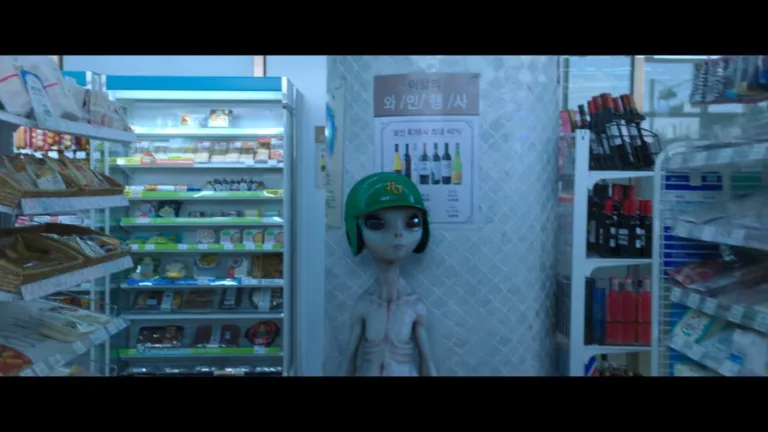
After her boyfriend disappears, she reconnects with childhood friend and UFO chaser, Heo Bora (Nana), in a quest to solve the various mysteries of her life. In doing so, she comes into contact with a crazed suicide cult run by the manipulative and power-hungry leader, Father.
From its first monologue, Glitch made its philosophical position clear. Neither aliens, nor God, nor magic, nor insanity. Something. Definitely something. But what it was, was inexplicable. A glitch in the Matrix.
Over ten episodes, Glitch painted a picture of how humans respond to things they can’t explain. They form groups, relationships, clusters of shared belief and then build a mythology together. Whether this is a church, a cult or a UFO group live streaming their investigations, they are all trying to explain the unexplainable based on assumptions they’ve made without evidence. They are manufacturing truth.
The cry of the cult, “It’s Father Light” and the cry of Ji-hyo, “It’s aliens!” eventually come together in a horrific mass suicide ceremony of hidden wires and pyrotechnic tricks.
And then… the real aliens show up.

Despite a strong opening episode, Glitch was less bingeable and less cracky than I had thought it would be. I found it more slow going than I was expecting and had to push through at several points to keep watching. The reason I did was because I wanted to make absolutely sure the writer wasn’t going to do something stupid like, well, have aliens be real!
Everything that had happened up until the denouement of the drama led to the conclusion that there were no aliens. There was something, that much was for certain. Definitely something. But all the characters were guilty of what we call the God of the Gaps fallacy. An argument from ignorance. “We don’t understand something, therefore God” has, in recent years, morphed into “We don’t understand something, therefore aliens”.
But it’s underpinned by the same fallacy.
Just because you don’t understand something, doesn’t mean you can insert your own meaning into it. A gap in our current understanding doesn’t mean aliens just as it doesn’t mean magic or demons or ghosts or God. Or hallucinations either for that matter.
Something currently inexplicable is just that. Currently inexplicable.
Some of the drama’s strongest messages are delivered by Father to Ji-hyo when he captures, drugs, interrogates and performs cranial surgery on her. A psychiatrist who abused one of his patients – Korea’s first alien abductee – he then marries her and uses her experiences to construct a religion.
“I wrote down everything she said then edited it so it would make sense,” he says with little irony. From the inexplicable he has created something entirely explicable, exploitable… and erroneous. The way that the cult uses flashy illusion, VR headsets and simple showground tricks involving wires alludes strongly to the way that the reality we live in is constructed from our experiences entwined with our relationships.
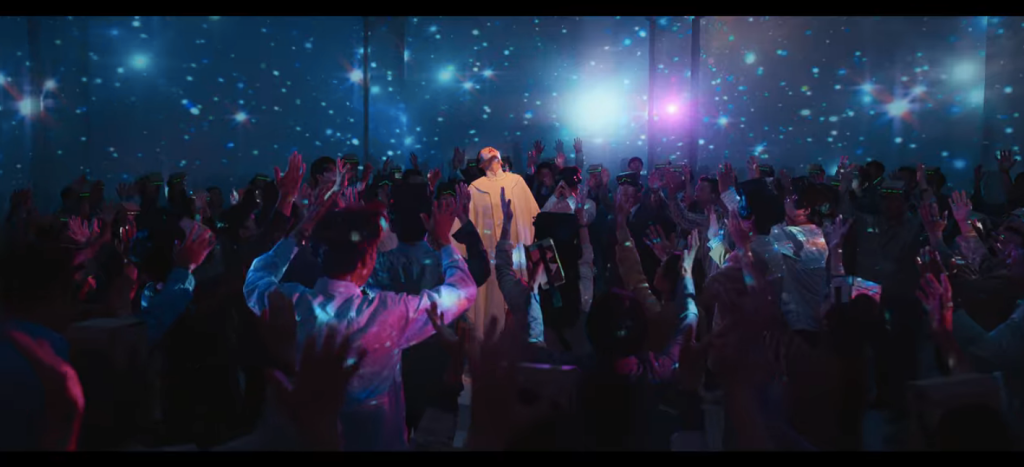
When Ji-hyo finally recovers her memory from middle school about her ‘abduction’, Father laughs in her face. Memory is constructed, rewritten and reinterpreted. By trying to recover the memory after her cultish interlude, her mind had simply grafted the alien story on top of whatever had really happened. And she was predisposed to think it was aliens in the first place. The fact is, Ji-hyo would never truly know what happened in that field of reeds when she was just a child.
To my mind, if the aliens were real then the point of the drama was completely undermined. It validates not just the behaviour of our very sympathetic but misguided female lead and her bromantic (romantic?) best friend. It also validates the behaviour of the cult and its followers.
The truth is out there! The aliens are real! They were both right all along!
Glitch seems to be a drama warning of the perils of investigating a strange occurrence based on an assumption that you know what’s going on. It also warns of trying to find a stronger personality to hand you answers based on that assumption. After Ji-hyo’s boyfriend disappears, she believes the cult that there are aliens who put a chip in her head. Why? Because she had already decided that was the case. In both cases, she was just looking for somebody to reinforce her own existing assumptions.
Throughout Glitch we see a Ji-hyo wilfully constructing her own reality based on subconscious influences (at one point she asks her boyfriend if he could have fed her subconscious information about baseball teams, a scene that is amusing for his general air of confusion but is later found to be true – only that it was her friend, Bora, who did this rather than him).
Bora and Ji-hyo are strong influences on each other from the time they meet in middle school, with Bora getting her alien obsession from Ji-hyo. (A Ji-hyo who was already convinced that aliens existed and people were getting abducted long before the something that happened in that field of reeds). From Bora, Ji-hyo got her subconscious memory of the Unicorns baseball team, the alien emoji she used to construct the image of the Grey stalking her, a tendency to smoke, and permission to be very not normal if not outright weird.
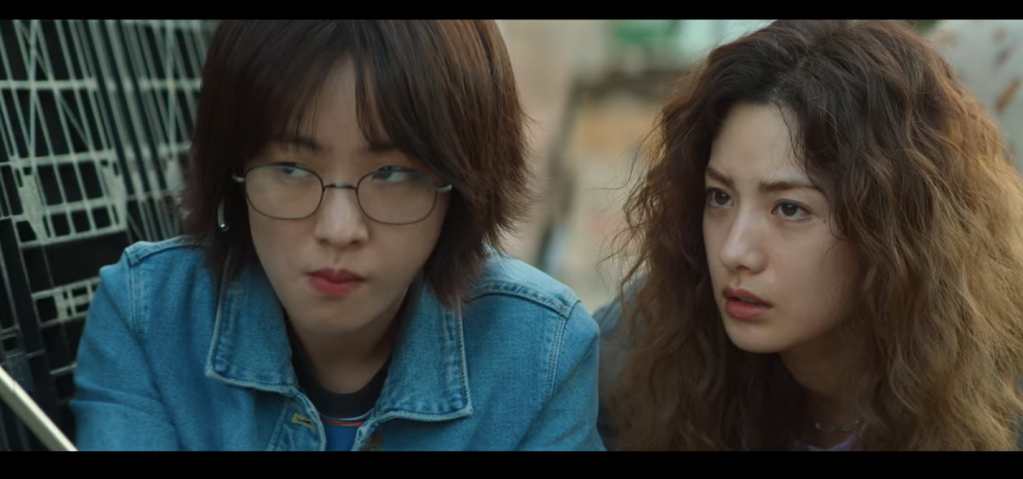
Glitch is a show about how we as humans construct reality, both as individuals and in groups. How we seek out those who perceive the world in the same way we do and use them to reinforce our existing biases and prejudices. And how that can ultimately be healing or incredibly destructive.
And yet when the aliens show up, all of that goes out the window. Ji-hyo becomes instead a crusader for truth in a world that wasn’t ready to hear it. This then validates the shared manufacturing of reality both of her delightful little family of fellow weirdos but also the cult itself.
So when the aliens showed up, I was deeply let down.
And so there I was. All poised with another entry for my still-unfinished blog post. Good drama. Bad ending.
My personal glitch or how everything I wrote above is wrong
After writing out my very disappointed bad ending post, I suddenly realised I was possibly wrong about everything. It’s funny how writing about something can completely change our perception of them. Writing about Glitch made me reconsider the show from a variety of different perspectives. It was a journey essentially, one that challenged how I also constructed my own reality of what I was watching. I now have another opinion on Glitch’s ending.
In one of the drama’s final scenes, after the alien intervention at the mass suicide convention, Ji-hyo explains the alien’s motives to her therapist. She believes that she and other abductees were tagged wildlife in some kind of alien ecological study. So, while both her UFO group and the cult were ultimately right about aliens, they were wrong about their intentions.
But where Ji-hyo drew her theory about being tagged is what makes this monologue interesting.
Throughout the drama, Ji-hyo’s father is consistently engaged in what I can only call exhausted normalcy. This involves sleeping on the couch, interfering with his daughter’s life, ignoring his wife, and watching nature documentaries on the television. Over and over again, we see him with the soundtrack of a documentary about sturgeons playing in the background.
It is this documentary that Ji-hyo references when explaining the alien’s motivations to her therapist.
This scene is either supposed to be an ‘Ah-ha!’ moment for the audience or, I now suspect, a way for the writer to clue us in to what’s really going on here. Ji-hyo’s final alien account is not backed by any definitive physical evidence. And we now know it is also pasted together from other parts of her conscious and subconscious lived experience. Her reliability as a narrator is again questioned.
Is ji-hyo’s version of events true? Or is it just the version that accords her the greatest psychological peace and that allows her to go on with her life?

The title of Glitch refers directly to the phrase “the glitch in the Matrix” from the 1999 film, The Matrix and its sequels. In that film, humanity is unknowingly trapped in a computer simulation from which our protagonists are trying to escape. Throughout the film, the lure of the comfortable lie wars with the harsh reality of the truth. And so, as a surface reading, Glitch seems to be talking about the way in which reality is constructed and how we, as people, react when something happens that contradicts that construction.
But there’s another, deeper, meaning here that is often lost when people talk about The Matrix. The Matrix was written by trans women about coming to terms with their identity in a world that was quite literally not programmed to accept it. Combined with the Wachowski’s subsequent televisual work, Sense8, there’s another interpretation we can bring to Glitch: self-discovery, personal honestly, and finding a group in which you belong.
If the world we live in is governed by laws set up by those who are seen as ‘normal’ – and if you don’t entirely fit into that box called ‘normal’ – then the key to happiness is to embrace your difference and find your people.
So while Glitch is about the construction of reality, it’s not about it in some kind of broader philosophical and existential sense. It’s not, in fact, about aliens or God or more fundamental questions about humanity as a whole. It’s not about how humanity deals with natural phenomena that it doesn’t understand.
It’s about instead the individual, the personal. The glitch here is Ji-hyo.
In the end, I don’t think Glitch is a drama about Ji-hyo finding aliens. I believe it’s a drama about Ji-hyo finding herself. It’s about her discovering where she fits in a world that isn’t made for her. Ji-hyo forces herself to walk the unhappy path of social norms until she’s finally jolted into breaking free.
Which brings us to the show’s subtle but clear implication that Ji-hyo and Bora are not just best friends but soulmates in a very romantic sense. Glitch, like The Matrix, is therefore not about objective universal truths. It’s instead about personal truths. Glitch is about Ji-hyo’s sexuality.
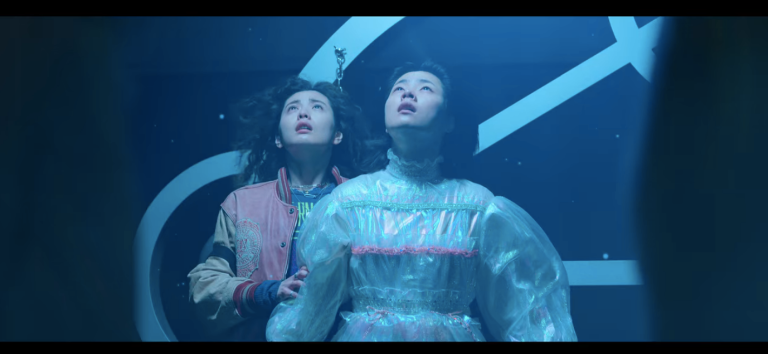
Ji-hyo, to be intensely reductive, is a lesbian woman in conservative neo-Confucian Korea. No wonder she doesn’t fit. The elephant in the room of her life is not an alien. The fact the alien she sees is made up of a melange of imagery taken from her friend, Bora, is no coincidence. The alien stalking her life is her silent, secret love for her best friend. The reality of her sexuality.
Suddenly the alien scene in the denouement takes on a whole new meaning. Ji-hyo and Bora, hand in hand, ascend to an intensely cathartic shared experience that validates their journey to this point. One that brings them finally peace.
Glitch’s final scene heading into the credits is of Ji-hyo asking Bora – the person whose crazy matches her crazy to coin a phrase – to move in with her. And it is this that is the drama’s happy ending. Ji-hyo has accepted what makes her happy, she’s found her tribe, and she’s ready to take the first steps down her new path in life.
Glitch then has a final scene that reinforces this interpretation. Tucked after the main credits, this scene asks us to re-examine our own assumptions as to what we just saw.
Ji-hyo’s boring, normal, almost robotic boyfriend, Lee Si-guk (Lee Dong-hwi) disappears at the beginning of the drama and returns later with no memory of his missing time. On paper, he cleaned out his loft, went to Bangkok and tried to kill himself. But is that a version of his story that makes the most sense? And if that’s not what happened then what did?
Neither abducted by the aliens or the cult, Si-guk’s disappearance seems engineered by entirely human hands but with mysterious and unexplained phenomena involved. Something is definitely not right with Si-gyuk.
He stands there, at the end, confronted by a giant alien Grey in a Unicorn’s helmet.
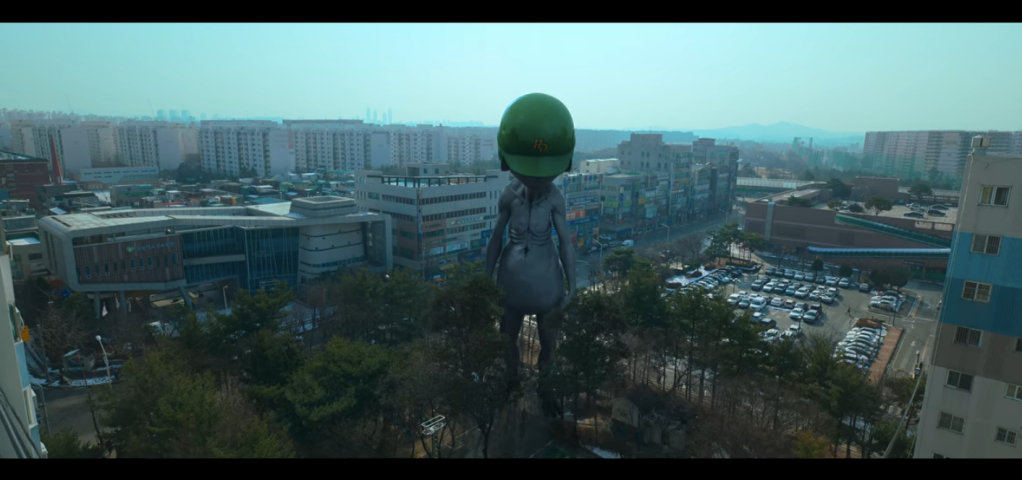
Something is going on here.
But what is it?
We simply don’t know.
But it seems that Si-guk too is a glitch. A glitch in the Matrix.
And that is why I think Glitch’s ending is not quite the glitch it originally appeared to be.
Glitch is available to stream in Netflix in Australia.
So is the award winning Australian series of the same name, which has nothing to do with this drama or this post but is also well worth watching.



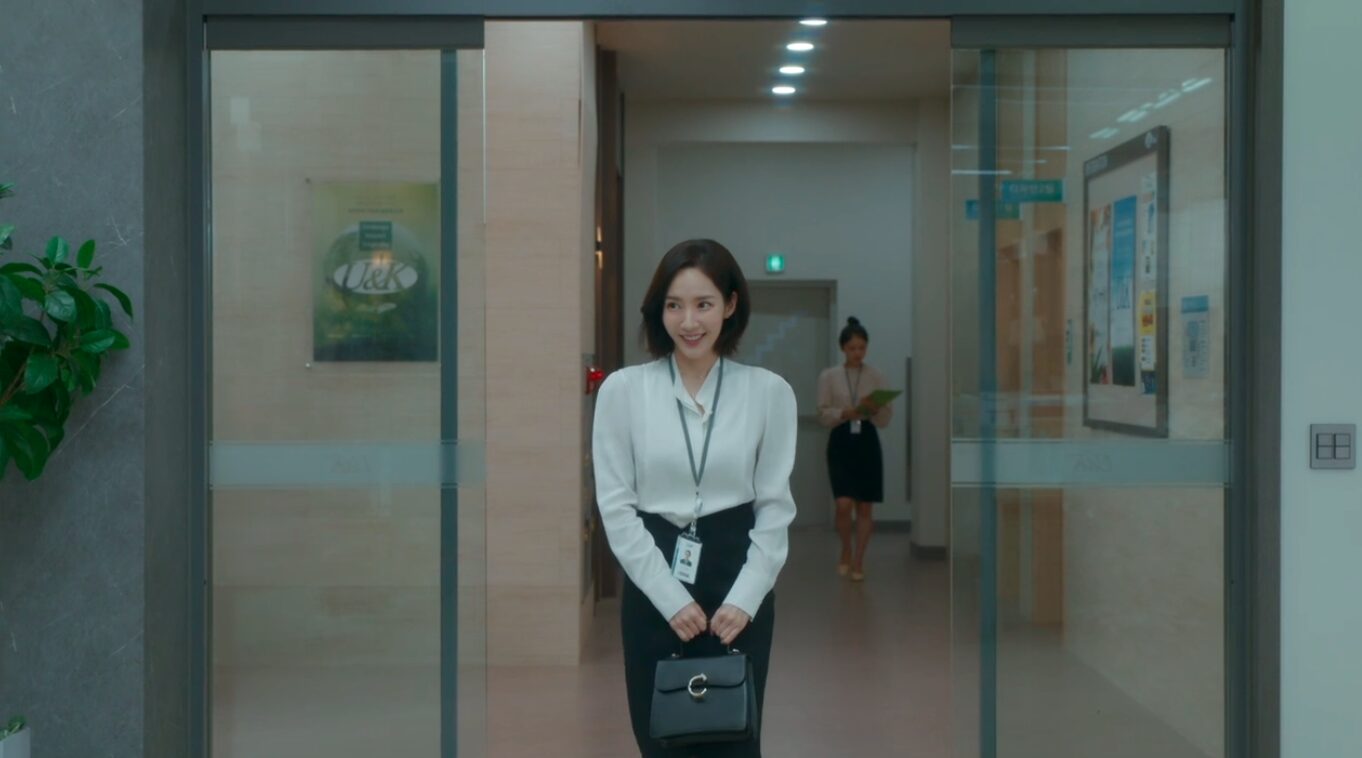
I finished Glitch after we were done with Doctor, so it has been quite a sci-fi weekend.
Overall I liked it a lot, and specially that I never really knew what was real and what was not. Don’t get me wrong, I love this in sci-fi. You mentioned The Matrix and it’s the obvious one, but while watching I couldn’t stop thinking about “Normal Again”, one of my favourite Buffy episodes, or ST:TNG “Frame of mind”.
It was to me clear that the friendship both women shared a deeper bond, and there are lots of love confessions throughout the drama. “Do you want to read them?” was back in teenage days and now the best one.